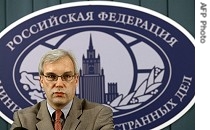2007年VOA标准英语-Russia Promises 'Targeted, Appropriate' Respons(在线收听)
Moscow
17 July 2007
Russia says it will have a "targeted and appropriate" response to Britain's expulsion Monday of four Russian diplomats. The two countries are at odds over the British probe into the poisoning death in London of a former KGB officer. But as VOA Correspondent Peter Fedynsky reports from Moscow, both countries appear to be seeking ways to protect average citizens from the damage caused by the standoff.
Political observers in Moscow predict Russia will respond in kind to Monday's decision by London to expel four Russian diplomats. But the Foreign Ministry appears in no hurry to announce specific measures.
 |
| Russian Deputy Foreign Minister Alexander Grushko reads a statement at the Foreign Ministry's offices, 17 July 2007 |
At the same time, said the Russian official, we will consider average citizens, tourists, cultural and academic exchange participants, and business circles. Grushko says Russia does not want such people to suffer because of actions by London.
A statement in Russian by the British ambassador to Moscow, Anthony Brenton, reflects a similar intention to avoid inconveniencing the public. "We are happy to see Russians in Britain and we continue to issue visas. The stricter measures relate only to visa requests from members of the Russian government," he said.
Relations between London and Moscow soured after Russia refused to extradite Alexander Lugovoi, a Russian citizen accused of murdering Kremlin critic and former KGB intelligence officer, Alexander Litvinenko. Litvinenko was poisoned with highly radioactive polonium. Lugovoi, also an ex-KGB spy, denies the British charge.
Russia's refusal to extradite is based on Article 61 of its Constitution, which says "a citizen of the Russian Federation may not be deported from Russia or extradited to another state." However, Article 63 seems to leave room for interpretation. That article states, "The extradition of people accused of a crime shall be carried out on the basis of federal law or the international agreement of the Russian Federation."
British Foreign Secretary David Miliband expressed concern Monday that Russian law is applied selectively.
Human rights activists in Moscow say there have been several instances of Russian citizens being extradited against their will.
One of them is Alisher Usmanov, who was charged with possession of explosives and sent to Uzbekistan, which accused him of religious extremism. Usmanov's defenders say the charges were trumped up.
Yelena Rabinina of the Civic Assistance Committee, Grazhdanskoye Sodeystviye, a Russian human-rights organization, has followed the Usmanov case and others like it.
"Russia treats the constitutional in a very selective manner," says Rabinina. "If it is inconvenient, as in the case of Lugovoi, Russian authorities present themselves as defenders of the law, but in a number of other cases they use various tricks to do what they want with the constitution."
Moscow, accuses Britain of ignoring extradition requests for Russian citizens accused of being embezzlers, terrorists, drug dealers and murderers. Russia has also requested the return of billionaire Boris Berezovsky to face fraud and corruption charges. Berezovksy, a vocal Kremlin critic, was a friend of the murdered Alexander Litvinenko.